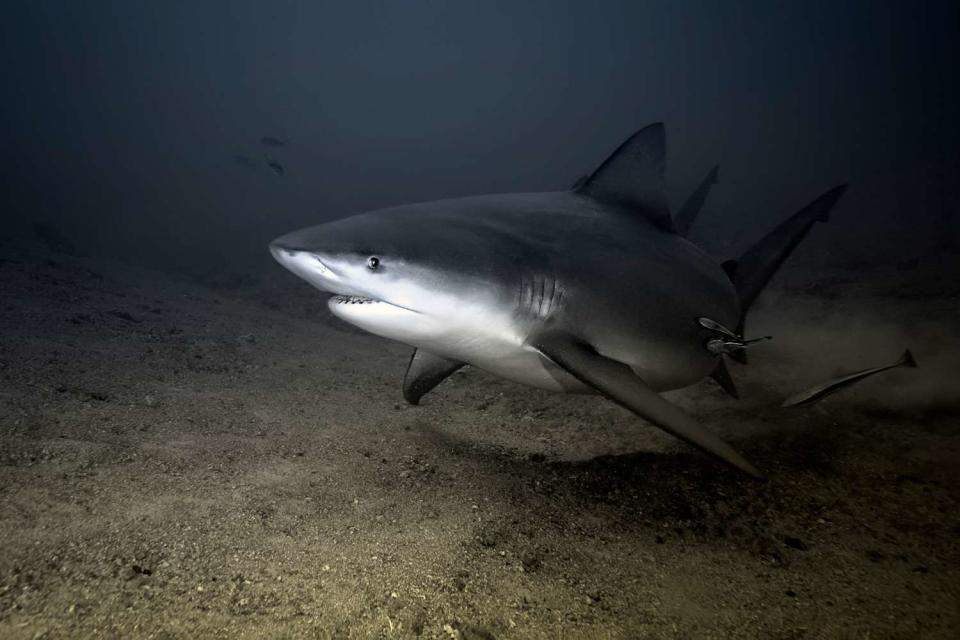Wild Sharks Living in Golf Course Lake Show Animals Can Survive Low-Salinity Habitats, Study Finds
An Australian golf club was home to bull shark-infested waters for nearly two decades

Dmitry Vinogradov/Getty
A bull shark, the same species of shark that became landlocked in a lake at an Australian golf course in 1996.For nearly two decades, an Australian golf club offered its members an unexpected attraction — bull shark-infested waters.
In 1996, floods carried a group of six juvenile bull sharks from bordering rivers into a lake at the Carbrook Golf Club near Brisbane, Australia, The New York Times reports. When the floodwaters receded, the sharks remained stranded in the 51-acre body of water near the course's 14th hole.
According to the Times, the sharks lived in the lake, fielding stray golf balls and surviving off of fish (and, occasionally, treats from club employees) for 17 years — and became the club's unofficial mascot.
The carnivorous fish (which grow to be 7 to 11.5 feet in length) are "aggressive, common, and usually live near high-population areas like tropical shorelines," characteristics that lead experts to consider them some of "the most dangerous sharks in the world," per National Geographic.
However, the shark species' fearsome reputation did not detract golfers from Carbrook.
Scott Wagstaff, the club's general manager, told the Times that people were quite delighted by the unusual animal presence.
"Every single member here just loves the sharks," he told the newspaper.
Wagstaff added that during his time as manager, he has seen the bull sharks "jump completely out of the water and spin as they land."
Related: Shocking Footage Shows Great White Shark Circling Man and Biting Camera Attached to His Head
Over time, one of the club’s landlocked sharks was illegally fished out, and others were carried out of the lake the same way they arrived in it — by floods.

Ron and Patty Thomas/Getty
A golf course. (Not the Carbrook Golf Club.)This Jaws-meets-Happy Gilmore tale is more than an interesting anecdote — it is also a microcosm of the shark species’ euryhalinity, or ability to live in both high and low-salinity bodies of water, a new study says.
In August, naturalist and shark scientist Peter Gausmann published research about the Carbrook creatures in an academic journal, Marine and Fishery Sciences.
In the study, Gausmann writes that the bull sharks’ stint at the club is “the longest uninterrupted duration in a low salinity environment that ever has been recorded in this species” — and thus demonstrates that the predators can survive for long periods in low-salinity environments.
According to the study, no bull sharks have been spotted at Carbrook in eight years, and their disappearance "remains a mystery." Had they remained undisturbed in the 14th-hole lake, however, the scientist claims that the original sharks could have lived to be 24 years old.
When this unique case is considered alongside others — bull sharks have survived for "many years" in other landlocked scenarios around the globe, according to Gausmann's report — it helps show the extent of the species' euryhalinity.
In other words, the Carbrook bull sharks demonstrate that members of the species can spend much of their lives in freshwater.
Never miss a story — sign up for PEOPLE's free daily newsletter to stay up-to-date on the best of what PEOPLE has to offer, from juicy celebrity news to compelling human interest stories.
In the final paragraphs of his study, Gausmann said that in future cases of landlocked bull sharks — either at the Australian golf course or elsewhere — scientists should monitor them closely to gain even more insights into the species' complex biology.
In the meantime, he recommends that folks steer clear of any water that floods have recently impacted.
"You should never bathe in stagnant bodies of water that once had a connection to the sea," he told the Times. "You never know if sharks are living there."
For more People news, make sure to sign up for our newsletter!
Read the original article on People.

